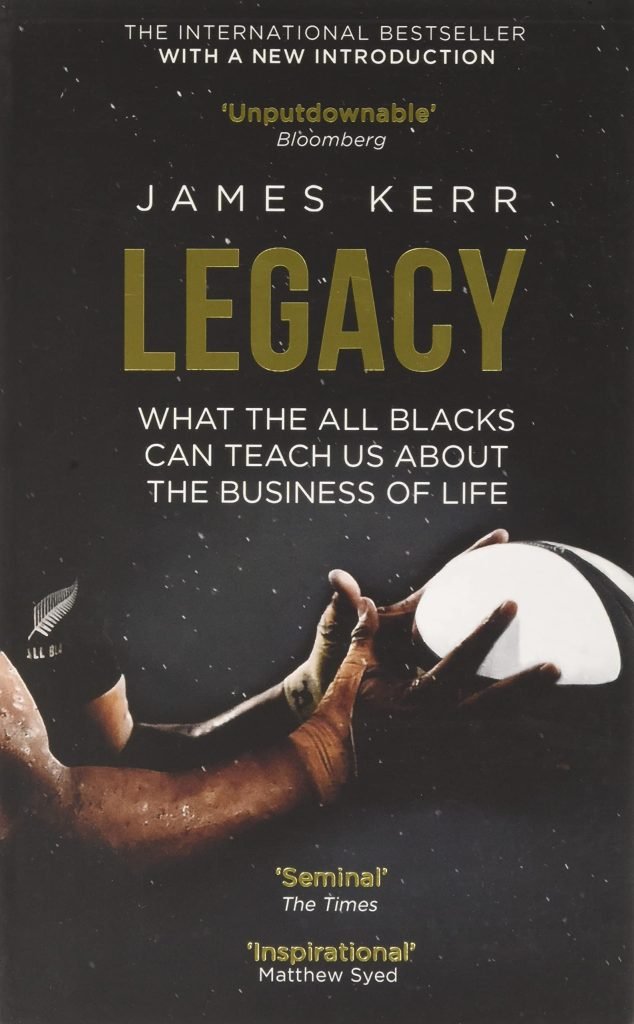Legacy: What the All Blacks Can Teach Us About the Business of Life is a book written by James Kerr that explores the values, beliefs, and practices of the New Zealand national rugby team, the All Blacks. The All Blacks are known for their success on the field and their strong team culture, and Kerr uses their experiences to offer insights and lessons on leadership, teamwork, and personal development.
One of the key themes of the book is the importance of culture and values in shaping an organization’s success. The All Blacks have a strong set of values that they refer to as the “All Black way,” which includes principles such as humility, discipline, and respect. These values are not just words on a page, but are deeply ingrained in the team’s culture and guide their actions on and off the field. Kerr discusses how the All Blacks have built a culture of continuous improvement, where every member of the team is constantly seeking ways to get better and help the team succeed. This culture of excellence is reflected in the team’s on-field performance, as they have consistently been one of the top-ranked teams in the world.
Another central theme of the book is the idea of “sweeping the sheds.” This concept refers to the team’s practice of cleaning up the locker room and equipment after every practice and game, regardless of their status or role on the team. Kerr argues that this simple act of humility and service to the team is a key component of the All Blacks’ success. By taking care of the small details and working together as a team, the All Blacks foster a sense of unity and purpose that allows them to achieve greatness on the field.
In addition to discussing the team’s values and practices, Legacy also explores the leadership style of the All Blacks and how it has contributed to their success. The team has a leadership group made up of players who are chosen for their ability to lead by example and inspire their teammates. These leaders are not just responsible for on-field performance, but also play a crucial role in shaping the team’s culture and values. Kerr discusses the importance of having a diverse group of leaders who can bring different perspectives and approaches to problem-solving.
One of the standout aspects of Legacy is the way that it ties together the All Blacks’ on-field performance with their team culture and values. The book illustrates how the team’s strong set of beliefs and practices, such as their focus on continuous improvement and humility, have helped them achieve success on the field. At the same time, their success on the field has reinforced and strengthened these values, creating a positive feedback loop.
Kerr also explores the role of sacrifice in the All Blacks’ success. He argues that the team’s commitment to putting the needs of the team above their own individual desires has played a significant role in their ability to achieve their goals. This is exemplified by the All Blacks’ “no dickheads” rule, which states that any player who puts their own interests above the team will be shown the door. By maintaining a culture of respect and selflessness, the All Blacks are able to build a strong sense of unity and purpose that allows them to overcome challenges and achieve their goals.
Another interesting aspect of the book is its discussion of the importance of mental toughness in achieving success. The All Blacks place a strong emphasis on developing mental resilience, and use techniques such as visualization and goal setting to help their players stay focused and motivated. Kerr argues that the ability to maintain a positive attitude and overcome adversity is crucial to achieving success, and the All Blacks’ focus on mental toughness has played a significant role in their success on the field.
In addition to its discussion of leadership and teamwork, Legacy also offers insights on personal development. The book discusses the importance of setting goals and continuously striving to improve, both as an individual and as a team. The All Blacks encourage their players to set high standards for themselves and to always be looking for ways to get better. This focus on personal growth helps to create a culture of excellence and drive the team’s success.
One of the unique aspects of Legacy is the way it approaches the topic of leadership. Rather than focusing on traditional leadership roles and hierarchies, the book highlights the importance of leadership at all levels of the organization. The All Blacks have a leadership group made up of players who are chosen for their ability to lead by example and inspire their teammates, but every member of the team is expected to take ownership of their role and contribute to the team’s success. This approach helps to create a culture of shared responsibility and accountability, where every member of the team is invested in the team’s success.
Overall, Legacy is a compelling and thought-provoking book that offers valuable insights on leadership, teamwork, and personal development. Whether you’re a fan of rugby or just looking to improve your own leadership skills, this book is well worth reading. It’s a reminder that success is not just about individual talent, but about building a strong culture and working together towards a common goal. The book’s focus on the All Blacks’ values and practices makes it a unique and engaging read, and its lessons are applicable to a wide range of industries and organizations. If you’re looking to improve your leadership skills and build a stronger, more successful team, Legacy is definitely worth checking out.



